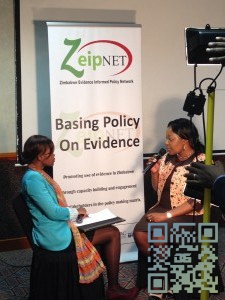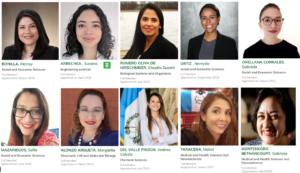
Evidence-informed policy making in Zimbabwe: Challenges, Successes and Opportunities
Guest post by Gilchriste Ndongwe and Ronald Munatsi from ZeipNET, Zimbabwe
Evidence-informed policy making (EIPM) is critical to ensuring good public policies. In Zimbabwe, EIPM is still in its infancy, but is starting to make progress. Now is a good time to start asking: what is Zimbabwe doing well in this area? What are the challenges to using evidence in policymaking? And what are the opportunities to see evidence become a routine part of Zimbabwe’s policymaking processes?
On 20 October 2015, the Zimbabwe Evidence Informed Policy Network (ZeipNET) is partnering with the United States (US) Embassy Public Affairs Section to host a knowledge café on “Evidence Informed Policymaking in Zimbabwe: Challenges, Successes and Opportunities”. The event will combine ZeipNET’s Knowledge Café series and the US Embassy’s Food for Thought series. Both platforms share a common goal of creating an enabling environment for engaging citizens, media, civil society and government departments on key national topical issues.
The objective of this Knowledge Café is to demystify and reflect on the concept of EIPM and to highlight challenges and opportunities for the use of evidence in Zimbabwe’s policy formulation, implementation, monitoring and review. Of particular note, the Knowledge Café seeks to obtain insight into what we can do to promote the routine use of evidence in policy making.
ZeipNET’s work on policy making, as part of the BCURE VakaYiko programme, has revealed that the concept of EIPM in Zimbabwe is still in its infancy. Policies in Zimbabwe continue to fail to be implemented or to make a difference. The policy-making system as a whole faces several challenges. These range from a lack of capacity to access, evaluate, synthesize and communicate evidence to a policy-making process that is fundamentally a political process prone to competing interests and motivations that are beyond the researcher’s control. On a practical note, time can be a major challenge. Research takes time and this can be out of step with policy processes.
In light of these challenges, this event will bring together people who occupy a critical space within Zimbabwe’s EIPM cycle, to start talking about solutions. It will bring together researchers who produce evidence; policy makers who use it; the media, who communicates policy issues to the public; and civil society organisations, academics, members of the general public and development partners.
Join ZeipNET on 20 October 2015 from 2.30pm to 5.00pm at the US Embassy Public Affairs Offices at Eastgate Mall (CBD), Harare.
About Knowledge Cafés (KCs)
KCs are targeted at the general public. These events aim to discuss the importance of using evidence in policy making. They can either discuss evidence-informed policy making (EIPM) in general or focus on a specific topic. KCs are informal events where content and language is made relevant for anyone interested in civic/public issues. Held in an informal setting, these events are open to everyone and will usually have approximately 40-70 participants. Furthermore, KCs provide ZeipNET with an opportunity to promote its work and be perceived as a credible organization that can engage researchers and policy makers to help improve Zimbabwe’s EIPM processes. A KC takes a participatory approach using audience-facilitated discussions that enables experience and maximum participation. For further information regarding KCs please read the VakaYiko Strategy for Policy Dialogues and Knowledge Cafes in Zimbabwe.
The Knowledge Café on 20 Oct
Moderators
Ronald Munatsi and Gilchrist Ndongwe, ZeipNET
Speakers
Charles Dhewa, Chief Executive Officer, Knowledge Transfer Africa (Pvt) Ltd and Knowledge Management Specialist
Onesimo Maguwu, Programme Manager, Knowledge Management, UNICEF Zimbabwe
Willie Ganda, Director, Research Development & Innovation in the Ministry of Higher and Tertiary Education, Science and Technology Development (tbc)
Gilchriste Ndongwe is Programme Manager, BCURE VakaYiko Programme and Co-Founder, Zimbabwe Evidence Informed Policy Network.
Ronald Munatsi is Programme Manager, BCURE VakaYiko Programme and Co-Founder, Zimbabwe Evidence Informed Policy Network.




